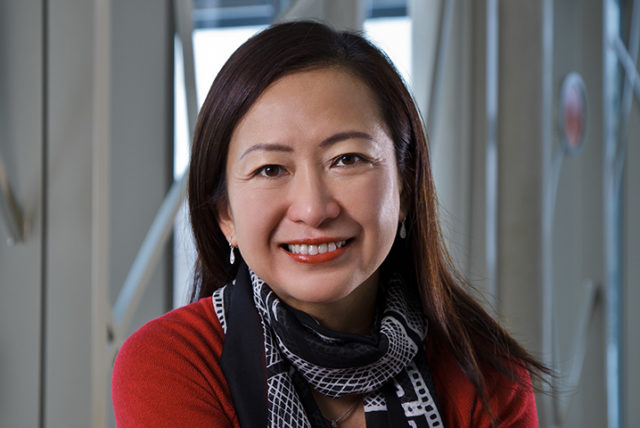 This story was produced for Badger Vibes, our collaboration with the Wisconsin Foundation and Alumni Association.
This story was produced for Badger Vibes, our collaboration with the Wisconsin Foundation and Alumni Association.
You’ve surely enjoyed a bit of people-watching at the mall.
Nancy Wong takes it to another level, though.
Wong is the chair of the Department of Consumer Science at UW–Madison’s School of Human Ecology. A recognized expert in consumer behavior, Wong brings her professorial lens to the place where you get your Cinnabon cinnamon roll.
“That’s why I like to go shopping, because all you need to do is just to watch what people do,” she says. “Seriously, my best ideas come from shopping malls.”
In fact, her first paper as a University of Michigan doctoral student began from the experience of eating ice cream outside a Louis Vuitton store in Singapore when a busload of Japanese tourists pulled up and started spending sizeable amounts of money. That prompted Wong to explore the topic of conspicuous consumption — buying expensive things mainly for the purpose of letting others know you can afford expensive things.
Now in her 10th year at UW–Madison and 5th year as department chair, Wong came to academia by a circuitous path.
Biochemistry was her first choice. As an international student finishing high school in Toronto, though, she heard from a school counselor that with a degree in chemistry, she’d have to go to graduate school to be anything other than a high school science teacher or lab assistant.
“Neither of those career options was very appealing to me,” she says, and neither was graduate school. “I was just contemplating college. I was also the first in my family in my generation to go to college. It wasn’t like I had any access to people who were able to give me advice. I was an international student from Malaysia. That was the first time I was overseas, in Toronto, and I had no one else to advise me on what courses to take.”
Plus, she says, her father always wanted her to be an accountant — so that’s the direction she went, earning a degree in accounting from York University, then going to work for the government as a part of Singapore’s Housing and Development Board.
“Then that was when I realized that I really don’t enjoy that work,” she says with a laugh. Luckily, though, the job let her spread her wings.
“I became an editor for the organization, writing annual reports, and I started writing speeches for the chairman and the CEO and doing all these policy announcements,” she recalls. “I realized that I actually like learning — how do you position certain things and changes and policies to appeal to your audience? I think, indirectly, I was doing marketing.”
Wong’s next step was to earn a master of business administration in marketing from the University of California–Los Angeles, followed by a year working for Macy’s in Atlanta, where her new husband was finishing his schooling. However, the marketing work there wasn’t exactly thrilling, either.
“I think they called [my job] ‘statistical analyst,’” she says. “I was basically analyzing their sales data. So it was almost like going back to my accounting roots. Then I decided that no, I want to go back to school.”
The Human Element
Back to school, that is, for a master’s degree and a doctorate in marketing — this time, focusing on the human element.
“I went into the PhD program in marketing, and then again, I had to make a choice,” she says. “Do I want to focus in consumer behavior, or do I want to focus on market modeling? At that level, market modeling becomes really, really dry. It’s just optimization and statistics and economic tricks and all of that. Then I realized, I have to take all these theory courses in psychology. I realized that I really like graduate-level psychology. I started getting involved in doing work in cross-cultural psychology.”
She says “it was like a light bulb went off” when she discovered cross-cultural psychology in the form of a paper by psychologists Hazel Rose Markus and Shinobu Kitayama, titled “Culture and the Self: Implications for Cognition, Emotion, and Motivation,” first published in 1991.
“I guess any international student, when you read that article, it makes you realize, ‘Whoa, it explains everything that I’ve been experiencing,’” she says. “I still use that article in my own graduate seminar. Every year when I have international students in my class, they read that. They say, ‘It all makes sense to me now.’ What we went through, because anyone who goes into different cultures will see that.”
The implications for cross-cultural psychology for marketing are fundamental for international businesses, Wong says.
“The large body of work in psychology is developed in North America, or is literally just Western psychology,” she says. “But then the thing is, it really explains very little about what the rest of the world thinks and how we interact with other people. It’s probably most valued in the context of international marketing, because multinational companies, like Proctor & Gamble and all the other multinationals, when they are actually developing products to enter the foreign market and all that, that is critical in helping them understand how they market it to consumers from different cultures. What works and what doesn’t work? What kind of adaptations do we have to make?”
One example of an adaptation? McDonald’s. Wong mentions her brother and niece, who live in Malaysia.
“My niece loves going to McDonald’s, but they consume something completely different than [in an American] McDonald’s because their entire product offering is basically completely adaptive to the eating habits of Asians,” Wong says.
Enough of the Big City
After stints in Singapore, Los Angeles, Atlanta, and Honolulu, Wong enjoyed the pace and safety of Ann Arbor, the slightly-smaller-than-Madison city where the University of Michigan is situated.
“I guess all my life, I’ve lived in all these big cities until I went to graduate school in Ann Arbor,” Wong says. “That was when I realized the advantage of living in a small town, especially a college town. I really did like that experience. After Honolulu, especially after Atlanta, I was tired of the big cities. I was actually working with somebody here [at UW–Madison] who had been my research collaborator for over 10 years before coming here. When I first visited Madison because of a research project, I said, ‘This is just like Ann Arbor.’ But it’s bigger. It’s actually prettier than Arbor.”
She arrived at UW–Madison at the height of the Great Recession, so for her first few years, hiring freezes and budget cuts were the reality. Lately, though, growth has been the order of the day. Her department, which offers majors in personal finance and retail consumer behavior, has doubled from 300 to 600 students, and soon the faculty will have grown from 8 to 14.
Wong’s own research interest has focused lately on the personal finance side of the department, and she’s been researching and writing about financial vulnerability — which isn’t the same as poverty, she’s quick to point out.
“What is remarkable is that some of the poorest people, with the lowest income, are actually financially secure because they’ve planned for everything, and they don’t have any financial obligations and they’re still able to save. To me that was a revelation. They may be poor, but they’re not vulnerable,” she says. “You could have these doctors and lawyers who are making high income. But then the thing is they live in a big house, they have a big mortgage, they have all this lavish spending, and they actually don’t have any savings. All it takes is just one thing to happen. The whole thing could just sort of spiral down.”
But in the end, it all comes down to the human mind.
“My basic research focus is anything to do with consumption decision-making, whether it’s personal, financial decision-making or luxury shopping,” Wong says. “It’s still the same thing. It’s still about people, psychology, and it’s no different.”


































